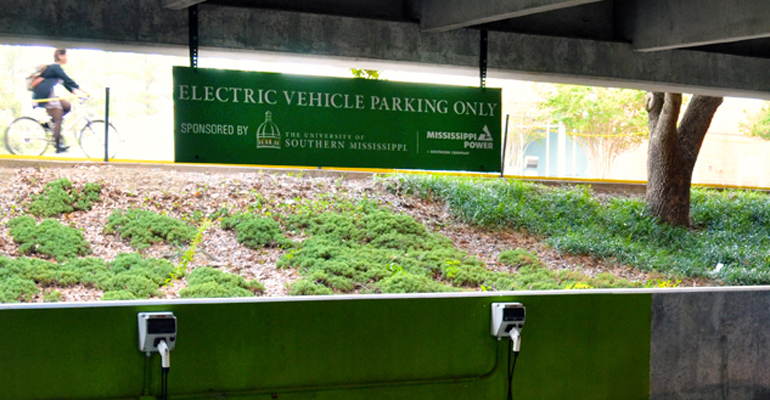Caption: Marked with green paint and a sign bearing the Mississippi Power logo, two parking spots for electric vehicles are located on the first floor of the parking garage on the Hattiesburg campus. – Kelley Joe Brumfield/Printz
The idea of electric vehicles is one that tends not to rest anywhere in the mind of the average consumer today, but it is a reality edging closer and closer.
The merits of such vehicles are becoming more difficult to ignore, and to accommodate these vehicles, there are several recharging parking spots on the USM campus where students can charge electric vehicles. However, they are rarely occupied by vehicles which can take advantage of this feature.
This raises the question to a public unaware or unaccepting of the possible advent of electric vehicles. What makes these vehicles worth the investment or time in comparison to the many gasoline-fueled vehicles which have been the standard for so long?
Allan Nolan, a graduate student in earth science education at USM, advocates for the use of electric vehicles and believes the merits of such vehicles are extensive enough for society to make a progressive move toward this type of transportation.
“I think that no matter the state of the country or the world, the end of fossil fuels will come,” Nolan said. “Maybe not tomorrow, or next year, or in this generation, but the end will happen. At that time, society will have no choice but to switch to some form of alternate fuels. Why not start that now instead of waiting for a panic and
price gouging?”
There are a number of counterpoints to the widespread public adoption of electric vehicles, including their pricing and the distance an electric vehicle can travel on a single charge. However, these are both points that can be argued with current evidence from many vehicle companies manufacturing electric models and the average distance commuters drive each day.
According to the U.S. Department of Energy, federal tax credits for owning electric vehicles can reach as high as $7,500, and prices have been reduced on a number of electric car models from manufacturers such as Tesla, Ford, Nissan and Mitsubishi.
The argument for distance is also called into question when most commuters in the United States drive an average of 33 miles per day, as revealed by the U.S. Department of Transportation Federal Highway Administration in 2012.
“Most EVs can go usually 85-100 miles per charge,” Nolan said.
For the average commuter, an electric vehicle would reduce their fuel emissions, thereby protecting the environment. It would service their needs as well. Of course, this also raises the question of how or when electric cars will be able to drive over longer distances.
Nolan said that hybrid cars were a potential temporary solution.
“Consumers have options for plug-in hybrid electric cars such as the Plug-In Prius, the Ford C-Max Energi, Ford Focus Energi, Fisker Karma and the Chevrolet Volt. These have backup gasoline engines to go any distance the battery cannot.”
Electric vehicles also have the added benefit of less required maintenance and fewer parts. This means that there is no need for oil changes or replacement engine parts, a boon for any non-gearhead interested in these types of vehicles.
Regardless of the fact that these vehicles are not a widespread staple of American transportation in any sense of the word, it is clear that each passing year builds a more compelling argument for their adoption.
The lack of awareness of these types of vehicles in Mississippi and the lack of usage of USM’s accommodations for electric cars is a problem which will likely be fixed in time. However, only time will tell if these changes will occur soon, or only when the supply of fossil fuels and gasoline has been fully exhausted.




























